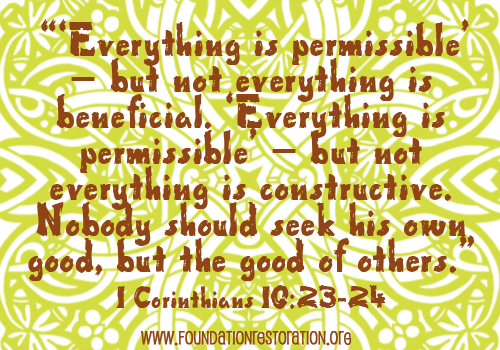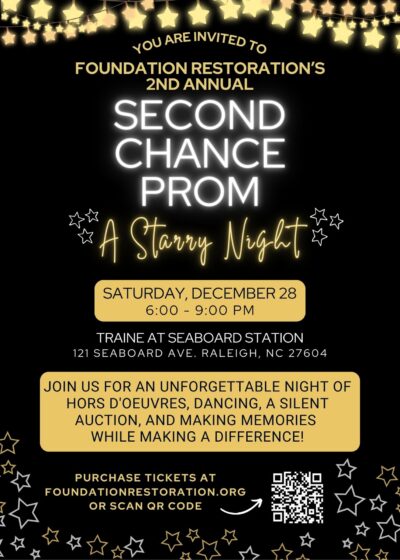By Ashley McIlwain
Have you ever asked yourself where you should draw the line? Perhaps you’ve had a conversation with a friend asking them about the “gray” area. How far is too far? Is this ok? Technically there is nothing wrong with doing x, y, or z, right?
It seems that we all like to push the limits. We do it from the time we are kids. We want to know just how far we can go and what all we can get away with. Instead of steering clear of all potential for danger, we like to blur the lines a bit, taking a walk on the wild side.
We’re asking the wrong questions though. It’s not what can we get away with, or how far can we go? Why walk along the cliff’s edge endangering ourselves and those around us, when we can safely move away from the unnecessary threat? The question we should be asking is, why is it that I want to even test the limits? Why would I want to risk bringing harm upon myself and my loved ones? What can I do to ensure safety and practice wisdom?
It’s shouldn’t be about pushing the limits but rather setting the standard. Why sell yourself short? Why risk it all pointlessly? Why put yourself in unnecessary danger?
Think about it this way. Would you go bungee jumping and add as much extra weight to yourself as possible taking the bungee cord to its maximum limit just to see if it can hold up when you jump? Or would you go skydiving without a parachute just to see if you could survive the fall? No! That would be suicide and stupid. Yet, that’s what we do all of the time in our lives, families, and marriages.
We take senseless and ill-advised risks that have deadly consequences. Then we wonder why there’s so much hurt and pain in our lives. Some of those wounds we can’t help, but a lot of them we can. By making wise, thoughtful, and prudent decisions, we can set ourselves up for success in a world that is dangerous enough on its own.
In 1 Corinthians 10:23-24, Paul wisely says, “‘Everything is permissible’ – but not everything is beneficial. ‘Everything is permissible’ – but not everything is constructive. Nobody should seek his own good, but the good of others.”

Just because you can do something, doesn’t mean you should. Acting carelessly and recklessly only leads to devastation, damage, and destruction for you and those around you. Yet, a lot of what we hear around us says, “Take the risk!” “Don’t limit yourself.” “If it feels good do it.” “Whatever makes you happy.” Unfortunately, these messages are lies that will lead you to anything but a feel-good, carefree, happy life.
Self-Control
1 Thessalonians 5:6 says, “So then, let us not be like others, who are asleep, but let us be alert and self-controlled.” Self-control is absolutely essential to every person’s life. Cautiously and carefully living our lives, weighing out the decisions we make, is a recipe for success. When we lose control, we add baggage and scars to our lives.
Think about a car. Cars are a wonderful luxury. They get us from point A to point B relatively easily and quickly. We can get around to where we need to go, and we can haul along things we need. Most of us cannot imagine life without a car. Yet, these incredible, useful, and somewhat essential contraptions can go from the greatest invention ever to a death trap. If you want to drive a car, you’ve got to follow the road signs, rules, and use common sense. You can’t just put the pedal to the metal going as fast as you want without any acknowledgement of what’s going on around you. Otherwise you are going to end up spinning out of control and in a serious accident hurting yourself and those in your path.
That’s how life is. It’s this amazing gift we’ve been given, but we need to use caution, common sense, and God-given guidelines in navigating through it. Otherwise we can end up damaging it severely or even losing it. We can’t allow ourselves to indulge our every desire, act on every impulse, or react to each emotion. Just because we want to, doesn’t mean we should. Just because we want to say it, doesn’t mean it needs to be said.
This is true in relationships. We can’t just fly off the handle on our spouse because we’re upset or had a bad day. Even if we are hurt by our spouse’s words or actions, we are not justified in hurting them back. Though we made be frustrated with a recurring problem in a marriage, that doesn’t give us the right to bash our spouse to our friends. We are responsible for our actions regardless of outside influences.
Possessing self-control is the first step to setting yourself up for success. When we lose self-control, we give Satan a foothold to come in and devour us (1 Peter 5:8). Think about the times you’ve experienced the most heartache in your life. Did it involve you losing self-control? Most likely that’s a, “Yes!” So, “Let us be self-controlled, putting on faith and love as a breastplate” (1 Thessalonians 5:8).
Boundaries
Most people want to do what they want, when they want. People don’t like limitations or boundaries. We don’t like to take, “No” for an answer. From the time we are kids, we push the limits and test the patience of loved ones trying to protect us.
We live in a world that says, “If it feels good, do it.” Political correctness is taking over, and no one wants to define right or wrong. Society says to just follow your heart, and allow your emotions to guide you. This is the fast lane to devastation and destruction.
God tells us in His Word that, “The heart is deceitful above all things and beyond cure. Who can understand it?” The truth is, lines must be drawn and boundaries established. Right and wrong must be defined. Sometimes we need to hear, “No!” We should lead our hearts, not follow them. Our emotions need to be controlled by us, not controlling us. This means we don’t always get our way, and that’s a good thing.
As a child I remember hearing, “No,” quite a few times. It always frustrated me, and I never understood my parents’ logic. What I wanted felt and seemed right to me, so I couldn’t wrap my mind around why my parents didn’t get it. Sometimes it felt like they were the fun police, making sure I missed out on all the super fun stuff awaiting me. As an adult though, looking back, I can see that my parents were so much wiser and prudent than I was. Their “policing” was what kept me from a lot of hurt along the way, and it eliminated me from carrying around a bunch of baggage from terrible decisions. Their boundaries and caution were what kept me safe when hazardous yet enticing things felt right to me.
There are times where things just feel right, but we can’t be so ignorant and irresponsible as to leave our lives and the lives of our loved ones up to our emotional whims. We need to set up checks and balances for ourselves, marriage, and family to keep things on track and everyone accountable. We need to ask ourselves and those who love us if what we are doing is in the best interest of everyone.
The question isn’t, “What can I get away with?” It should be, “What is the best decision that will set me (my family, my marriage, my life, etc.) up for success?” Are your actions glorifying God, who has so lovingly given you His Word to help protect and guide you through this life? Are your behaviors taking into account your loved ones and the big picture?
If you are asking if something is permissible, then most likely it’s the very thing you should steer clear of. Don’t walk along the edge of the cliff; you’re just asking for disaster. Be wise, practice self-control, and set up boundaries. These don’t keep you from living; they keep you living your life to the fullest with the least amount of damage, heartbreak, baggage, and scars possible.
Be very careful, then, how you live – not as unwise but as wise, making the most of every opportunity, because the days are evil. Therefore do not be foolish, but understand what the Lord’s will is. –Ephesians 5:15-17
Copyright © 2012, Foundation Restoration. ALL RIGHTS RESERVED. No reproduction allowed without written permission from Foundation Restoration and/or the author.






Love it. Love what you wrote makes good sense.
Tisha, thanks!